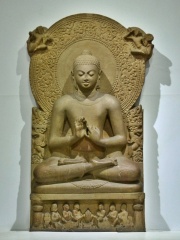
The Most Famous
PHILOSOPHERS from Nepal
This page contains a list of the greatest Nepalese Philosophers. The pantheon dataset contains 1,267 Philosophers, 1 of which were born in Nepal. This makes Nepal the birth place of the 63rd most number of Philosophers behind Bangladesh, and South Africa.
Top 1
The following people are considered by Pantheon to be the most legendary Nepalese Philosophers of all time. This list of famous Nepalese Philosophers is sorted by HPI (Historical Popularity Index), a metric that aggregates information on a biography's online popularity.

1. Gautama Buddha (566 BC - 452 BC)
With an HPI of 99.48, Gautama Buddha is the most famous Nepalese Philosopher. His biography has been translated into 209 different languages on wikipedia.
Siddhartha Gautama, most commonly referred to as the Buddha (lit. 'the awakened one'), was a wandering ascetic and religious teacher who lived in the eastern Indo-Gangetic Plains during the 6th or 5th century BCE and founded Buddhism. According to Buddhist legends, he was born in Lumbini, in what is now Nepal, to royal parents of the Shakya clan, but renounced his home life to live as a wandering ascetic. After leading a life of mendicancy, asceticism, and meditation, he attained nirvana at Bodh Gaya in what is now India. The Buddha then wandered through the lower Indo-Gangetic Plain, teaching and building a monastic order (sangha). Buddhist tradition holds he died in Kushinagar and reached parinirvana ("final release from conditioned existence"). According to Buddhist tradition, the Buddha taught a Middle Way between sensual indulgence and severe asceticism, leading to freedom from ignorance, craving, rebirth, and suffering. His core teachings are summarised in the Four Noble Truths and the Noble Eightfold Path, a training of the mind that includes ethical training and kindness toward others, and meditative practices such as sense restraint, mindfulness, dhyana (meditation proper). Another key element of his teachings are the concepts of the five skandhas and dependent origination, describing how all dharmas (both mental states and concrete 'things') come into being, and cease to be, depending on other dharmas, lacking an existence on their own (svabhava). While in the Nikayas, he frequently refers to himself as the Tathāgata; the earliest attestation of the title Buddha is from the 3rd century BCE, meaning 'Awakened One' or 'Enlightened One'. His teachings were compiled by the Buddhist community into the Vinaya Piṭaka, containing codes for monastic discipline, and the Sūtra Piṭaka, a collection of discourses attributed to him. These were passed down in Middle Indo-Aryan dialects through an oral tradition. Later generations composed additional texts, such as systematic treatises known as Abhidharma, biographies of the Buddha, collections of stories about his past lives known as Jataka tales, and additional discourses, i.e., the Mahāyāna sūtras. Buddhism evolved into a variety of traditions and practices, represented by Theravāda, Mahāyāna and Vajrayāna, and spread beyond the Indian subcontinent. While Buddhism declined in India, and mostly disappeared after the 8th century CE due to a lack of popular and economic support, Buddhism has grown more prominent in Southeast and East Asia.
People
Pantheon has 1 people classified as Nepalese philosophers born between 566 BC and 566 BC. Of these 1, none of them are still alive today. The most famous deceased Nepalese philosophers include Gautama Buddha.

